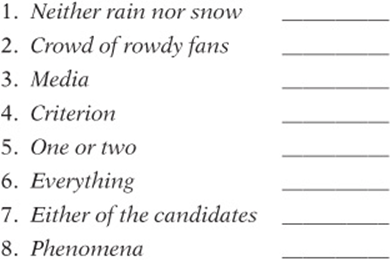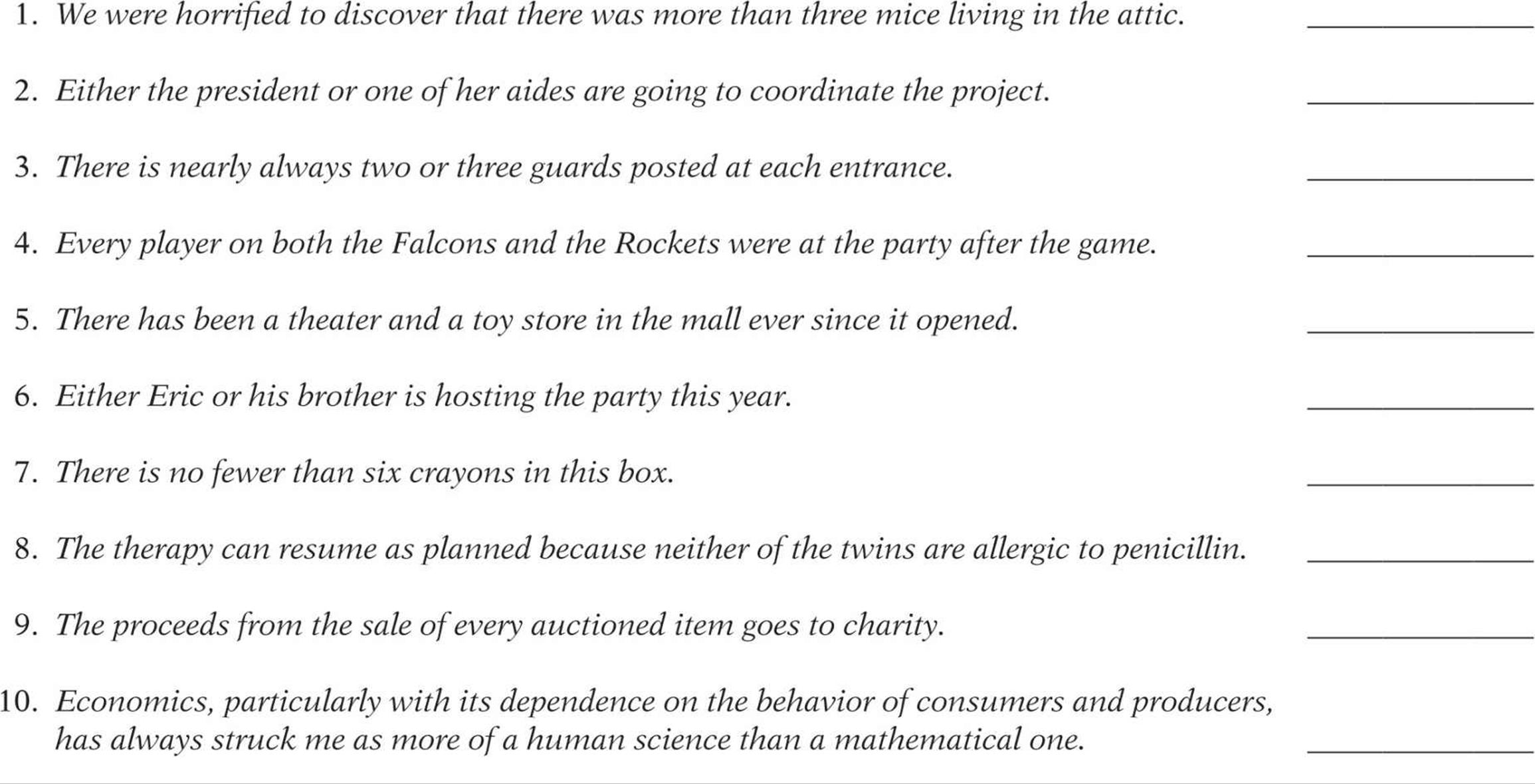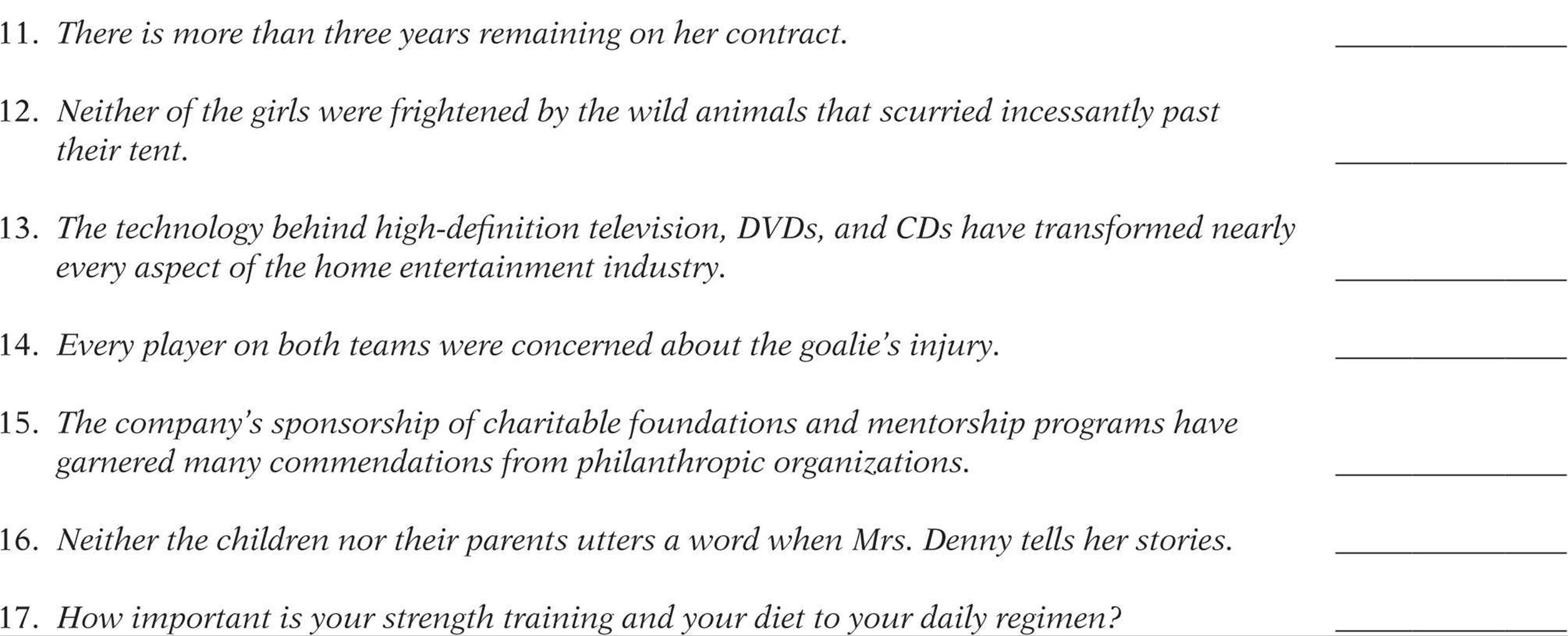SAT Test Prep
CHAPTER 15
ESSENTIAL GRAMMAR SKILLS
1. Subject-Verb Disagreement
2. Trimming Sentences
3. Parallelism
4. Comparison Problems
5. Pronoun-Antecedent Disagreement
6. Pronoun Case
7. Dangling and Misplaced Participles
8. Other Misplaced Modifiers
9. Tricky Tenses
10. Idiom Errors
11. Diction Errors
12. Other Modifier Problems
13. Irregular Verbs
14. The Subjunctive Mood
15. Coordinating Ideas

Lesson 1: Subject-Verb Disagreement
Finding Verbs
The verb is the most important part of a sentence, but verbs aren”t always easy to spot. Consider the word swim in the sentences The ducks swim in the pond and The ducks love to swim. In the first sentence, swim is the verb. In the second sentence, swim is part of a noun phrase. (To swim is the thing that the ducks love.) So how do we spot verbs?
A verb is what conveys the essential meaning of a clause (a string of words that convey an idea). Every idea requires a verb. The sentence The ducks swim in the pond says that Something swims somewhere, so the verb is swim. The sentence The ducks love to swim says that Something loves something, so the verb is love. Every verb requires a subject, that is, what does the verb. In both sentences, the subject is ducks. A verb may also require an object, that is, what receives the verb. In The ducks love to swim, the object is to swim, because that is the thing that is loved.
Example:
When David approached third base, the coach waved him home.
This sentence contains two related ideas, so it contains two clauses, and therefore two verbs:
Clause 1:When David approached third base Verb: approached Subject: David Object: third base
Clause 2:the coach waved him home Verb: waved Subject: the coach Object: him
Subject-Verb Disagreement (SVD)
Every verb must agree in number (singular or plural) with its subject. Subject-verb disagreement is one of the most common errors tested for on the SAT. If you are a native speaker of English, the best way to check for subject-verb disagreement is to find the subject and verb (ignoring all the intervening words) and say them together.
Example:
The people, who are easily persuaded by corporate-sponsored media, spends very little time analyzing issues.
The subject of the verb spends is people. But people spends sounds wrong, because spends is the “third person singular” form—as in he spends—but people is plural, so the phrase should be people spend.
Tricky Plurals and Singulars
These rules will help you to check whether a verb agrees in “number” with its subject:
Phrases like Sam and Bob are plural, but phrases like Sam, in addition to Bob, are singular. Phrases that start as well as …, together with …, along with …, or in addition to … are interrupters, which are not part of the main subject.
These words are singular: each, anyone, anybody, anything, another, neither, either, every, everyone, someone, no one, somebody, everything, little, and much. To check for SVD, you can replace any of them with it.
These words are plural: phenomena (singular: phenomenon), media (singular: medium), data (singular: datum), and criteria (singular: criterion). To check for SVD, you can replace any of them with they.
All of the following can be either singular or plural, according to the noun that follows the of: none (of), any (of), some (of), most (of), more (of), and all (of).
Verbs that follow subjects of the form either A or B and neither A nor B must agree with B, the noun closer to the verb.
Inverted Sentences
Usually the subject comes before the verb, but inverted clauses have the subject after the verb. For instance, sentences that start There is … or There are … are inverted. To check subject-verb agreement in these sentences, first “uninvert” them.
Example:
There ![]() many
many ![]() in the barn. (inverted)
in the barn. (inverted)
Many ![]()
![]() in the barn. (uninverted)
in the barn. (uninverted)
Concept Review 1: Subject-Verb Disagreement
Next to each noun or noun phrase, write “S” if it is singular or “P” if it is plural.

Circle the subject in each sentence, and choose the correct verb.
9. Neither of the cars (is/are) equipped with antilock brakes.
10. The flock of geese (was/were) startled by the shotgun blast.
11. The data on my computer (was/were) completely erased when the power failed.
12. Mathematics and history (is/are) my favorite subjects.
13. None of the roast (was/were) eaten.
14. All of the games (was/were) played on real grass fields.
15. Pride and Prejudice (is/are) my favorite Jane Austen novel.
16. Neither of the twins (is/are) allergic to penicillin.
17. Much of what I hear in those lectures (goes/go) in one ear and out the other.
18. Amy, along with Jamie and Jen, (is/are) applying to Mount Holyoke.
19. None of the books (was/were) considered fit for public consumption.
20. All of the eggplant (was/were) used to make the sauce.
21. Amid the lilies and wildflowers (was/were) one solitary rose.
22. Either Ben or his brothers (is/are) in charge of bringing the drinks.
23. There (is/are) hardly even a speck of dirt left on the carpet.
24. “Stop right there!” (shouts/shout) the Bailey brothers, who are standing in front of me.
25. Either the Donovans or Dave (is/are) going to bring the plates.
26. There (is/are) at least a hundred people here.
“Uninvert” the following sentences so that the verb follows the subject, then choose the correct verb form.
27. There (is/are), in my opinion, far too many smokers in this restaurant.
_________________________________________________________________________________________________
28. Over that hill (is/are) thousands of bison.
_________________________________________________________________________________________________
29. Riding on the bus among the children (was/were) over a dozen commuters.
_________________________________________________________________________________________________
30. Never before (has/have) there been such voices heard here.
__________________________________________________________________________________________________
31. Absent from the article (was/were) any mention of the director”s previous Broadway failures.
_______________________________________________________________________________________________
Worksheet 1: Subject-Verb Disagreement
Label each verb in the following sentences with a “V” and each subject with an “S.” If any verbs are incorrect, cross them out and write the correct form in the blank.


Answer Key 1:
Subject-Verb Disagreement
Concept Review 1
1. S
2. S
3. P
4. S
5. P
6. S
7. S
8. P
9. s: neither, v: is
10. s: flock, v: was
11. s: data, v: were (data is plural)
12. s: mathematics and history, v: are
13. s: none (roast), v: was
14. s: all (games), v: were
15. s: Pride and Prejudice, v: is
16. s: neither, v: is
17. s: much, v: goes
18. s: Amy, v: is
19. s: none (books), v: were
20. s: all (eggplant), v: was
21. s: rose, v: was
22. s: brothers, v: are
23. s: speck, v: is
24. s: Bailey brothers, v: shout
25. s: Dave, v: is
26. s: people, v: are
27. Far too many smokers, in my opinion, are in this restaurant.
28. Thousands of bison are over that hill.
29. Among the children, over a dozen commuters were riding on the bus.
30. Such voices have never before been heard here.
31. Any mention of the director”s previous Broadway failures was absent from the article.
Worksheet 1
1. s: we, v: were (correct); s: mice, v: was (change to were)
2. s: one, v: are (change to is)
3. s: guards, v: is (change to are)
4. s: every player, v: were (change to was)
5. s: a theater and a toy store, v: has been (change to have been)
6. s: his brother, v: is (correct)
7. s: crayons, v: is (change to are)
8. s: therapy, v: can resume (correct); s: neither, v: are (change to is)
9. s: proceeds, v: goes (change to go)
10. s: economics, v: has struck (correct)
11. s: years, v: is (change to are)
12. s: neither, v: were (change to was)
13. s: technology, v: have transformed (change to has transformed)
14. s: every player, v: were (change to was)
15. s: sponsorship, v: have garnered (change to has garnered)
16. s: their parents, v: utters (change to utter); s: Mrs. Denny, v: tells
17. s: your strength training and your diet, v: is (change to are)